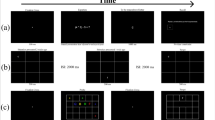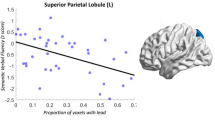The aim of this study was to assess the neuropsychological status of patients and their P300 cognitive evoked potentials and to attempt to evaluate the clinical significance of cerebral atrophy in multiple sclerosis (MS). Neuropsychological studies were performed in 109 patients with MS. Cognitive functions were evaluated using the mini-mental state examination (MMSE), the frontal assessment battery (FAB), the A. R. Luriya method, and P300 cognitive evoked potentials; MRI data from 71 patients were also analyzed. The results obtained from these studies led to the conclusion that changes in status and cognitive function, disease activity, and the severity of cerebral atrophy are correlated.
Similar content being viewed by others
References
T. G. Alekseeva, A. N. Boiko, Yu. L. Razhba, et al., “A complex approach to assessing the cognitive and emotional-personality domains in multiple sclerosis patients,” Zh. Nevrol. Psikhiat., Rass. Skleroz, 102, 20–25 (2002).
A. N. Boiko, S. V. Petrov, E. I. Gusev, and V. A. Nesterova, “Mechanism of development of the neurodegenerative process in multiple sclerosis – the neuroprotective effect of ®-interferon formulations today and neurotrophic factors tomorrow,” Zh. Nevrol. Psikhiat., Rass. Skleroz, 103, No. 2, 83–90 (2003).
V. V. Gnezditskii, Evoked Brain Potentials in Clinical Practice [in Russian], Medpress-inform, Moscow (2003).
T. L. Demina, M. V. Davydovskaya, T. D. Zhuchenko, et al., “Studies of glatiramer acetate (Copaxone) in the treatment of patients with multiple sclerosis. Experience at the Multiple Sclerosis Center,” Zh. Nevrol. Psikhiat., Rass. Skleroz, 103, No. 2, 91–97 (2003).
O. A. Khondkarian, I. A. Zavalishin, and O. M. Nevskaya, Multiple Sclerosis, Meditsina, Moscow (1987).
M. P. Amato and V. Zipoli, “Clinical management of cognitive impairment in multiple sclerosis: a review of current evidence,” Multiple Sclerosis, 10, 73–83 (2003).
J. C. Brassington and N. V. Marsh, “Neuropsychological aspects of multiple sclerosis,” Neuropsychol. Rev., 8, 43–77 (1998).
Author information
Authors and Affiliations
Corresponding author
Additional information
Translated from Zhurnal Nevrologii i Psikhiatrii imeni S. S. Korsakova, Vol. 113, No. 2, Iss. II, Multiple Sclerosis, pp. 57–60, February, 2013.
Rights and permissions
About this article
Cite this article
Alifirova, V.M., Musina, N.F. Cognitive Impairments in Patients with Multiple Sclerosis: Correlations Between Neuropsychological, Neurophysiological, and Neuroimaging Parameters. Neurosci Behav Physi 44, 517–519 (2014). https://doi.org/10.1007/s11055-014-9942-1
Published:
Issue Date:
DOI: https://doi.org/10.1007/s11055-014-9942-1




